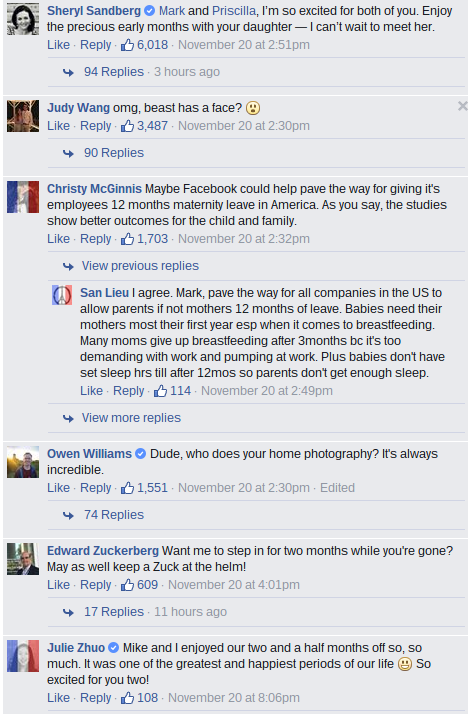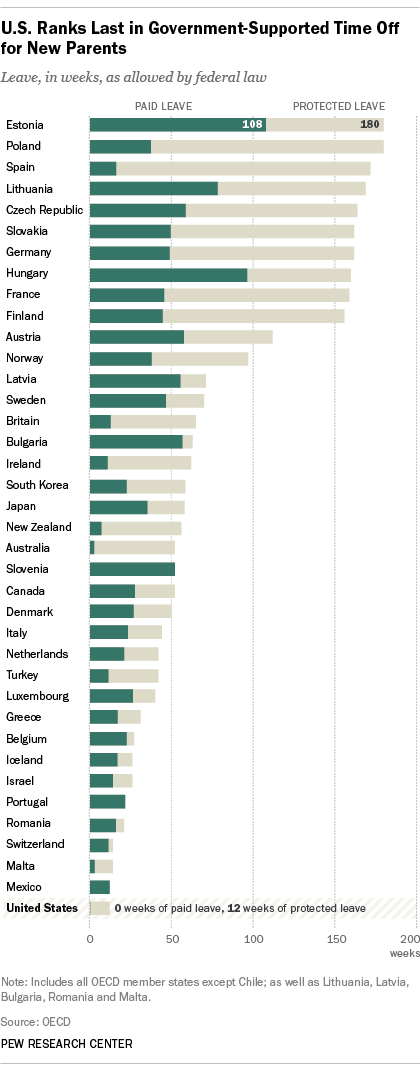Why Mark Zuckerberg's Paternity Leave Announcement Matters

By:
Mark Zuckerberg just announced on Facebook that he will take two months off to be with his newborn baby, making a bold statement about the importance of parental leave.
"I've decided to take 2 months of paternity leave when our daughter arrives," the Facebook CEO wrote in a status update featuring a photo of his dog, Beast. "Studies show that when working parents take time to be with their newborns, outcomes are better for the children and families. At Facebook we offer our US employees up to 4 months of paid maternity or paternity leave which they can take throughout the year."
RELATED: Mark Zuckerberg Just Highlighted a Painful Health Issue That's Rarely Discussed
Zuckerberg's announcement received more than 300,000 Facebook likes. COO Sheryl Sandberg, a champion for family time and work-life balance, voiced her support for the decision as well:
 Mark Zuckerberg Facebook - facebook.com
Mark Zuckerberg Facebook - facebook.com
While Zuckerberg, of course, has the option of deciding how much time to take off as the company's founder and a self-made billionaire, many commended him for promoting family leave and showing support for new parents.
ALSO: One Huge Reason Men Hesitate to Take Paternity Leave
"Although it was a personal announcement, the statement by one of the world’s most powerful business executives will no doubt be seen as an endorsement of the idea that everyone—no matter how senior—should take time off after a baby is born," Slate's Daniel Politi wrote.
As noted by Politi, it's significant to see the head of a major tech company publicly embrace family time in a competitive industry, even one that happens to be shifting in favor of work-life balance. Zuckerberg's decision comes shortly after fellow tech giant, Netflix made headlines for announcing that new parents will receive unlimited paid parental leave for the first year of their child's life or adoption.
ALSO: Netflix Just Made an Amazing Announcement for Families
Zuckerberg's priorities are also worth noting because the U.S. has proven to be a big disappointment with regards to family leave. According to a 2013 Pew Research Center report, America ranks last for weeks of paid leave and protected leave in a list of 38 nations.
 Pew Research Center/OECD - pewresearch.org
Pew Research Center/OECD - pewresearch.org
As ATTN: has noted before, the U.S. guarantees zero weeks of paid leave and 12 weeks of protected leave. Under the Family and Medical Leave Act (FMLA), you may return to your job after three months of leave, but only if you work at a company of 50 or more people and have been with the company for at least a year. Your boss is not required to pay you for this time off.
Workers at smaller companies are especially at a disadvantage because it's completely up to their managers whether they will receive any type of family leave.
RELATED: 3 Ways that the U.S. is Failing Mothers
 Flickr/imnotquitejack - flic.kr
Flickr/imnotquitejack - flic.kr
Even those who do receive parental leave can face consequences at the office, particularly if they're male workers. Scott Coltrane, a sociologist studying fatherhood, told the New York Times last year that some men don't take advantage of paternity leave because they don't want to feel any backlash for this decision at work.
“There is still some stigma about men who say, ‘My kids are more important than my work,’” Coltrane said. “And basically that’s the message when men take it.”
Ed, a marketing vice president for a clothing retailer back East, told Forbes in 2013 that he could tell his managers were unhappy when he decided to take vacation after going on a 7-day paternity leave.
“When I took my leave my bosses did not complain outright, but I definitely sensed an air of disappointment,” Ed told Forbes. ”One asked me outright if I still intended to use my already scheduled vacation days during the summer. I don’t think he was happy with the ‘yes’ response he received."
When dads do have the privilege of spending time with their kids, however, the family unit as a whole seems to be more stable. Jane Waldfogel, a professor of social work at Columbia University, told The Times last year that men who are a part of their children's lives early on tend to stay involved throughout the kid's life.
“Part of the rationale for paternity leave is if men are able to be very involved early on in the care of their children, they’re going to be more involved ever after, and it will translate to more equal sharing and equal roles,” she said.
Christopher Ruhm, a professor of public policy and economics at the University of Virginia, also told The Times that our country is slowly but surely moving in the direction of de-stigmatizing leave.
"What we do in terms of the laws and the rights that we provide gradually changes cultural norms," Ruhm said. "They’re starting to say that taking leave around the time you have a new child is not a bad thing. It’s expected."
